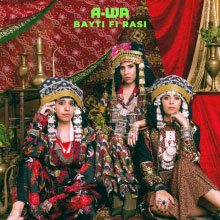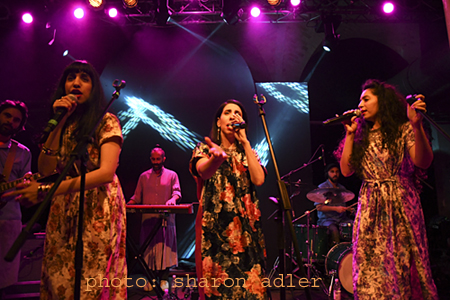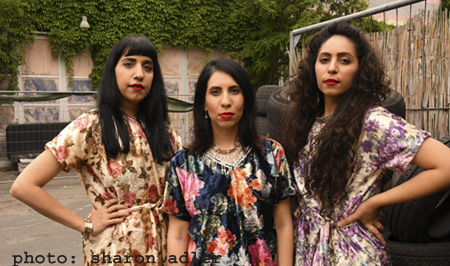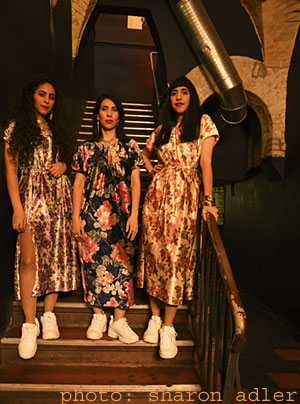AVIVA-Berlin >
Interviews
AVIVA-BERLIN.de im Februar 2026 -
Beitrag vom 14.06.2019

A-WA - BAYTI FI RASI. The AVIVA-interview with the Yemenite-Israeli sisters Tair, Liron, Tagel Haim
Sharon Adler
A-WA means "Yes" in Arabic, "BAYTI FI RASI" means "My Home Is In My Head". A-WA is the bandname of three sisters, who grew up in the desert in southern Israel. Today the trio performs in Clubs and Festivals worldwide to bring the almost extinct Yemeni songs of women into the world, who never learned how to read or write. Their concept album is based on the courageous story of their great grandmother Rachel, coming from Yemen to Israel as one of 49,000 Yemenite Jews as a single mom in 1949ôÇs historic "Operation Magic Carpet."
"The Yemenite is the DNA of A-WA" (A-WA)
Tair, Liron, Tagel Haim were born in the communal settlement of Shaharut, a community of about 30 families in the desertic and remote Arava Valley of southern Israel. Here they grew up with one more brother and two sisters, who are "also very musical and creative but we were always close and I think it was always like the three of us together or separated. I think we three were a band, even before we knew it. And many years ago we wrote together, performed together and we had this bond, so I think itôÇs no wonder that weôÇre doing this."
Their parents are second generation of pioneer sabras, their mother is Ukrainian and Moroccan, whereas their father is from SanaôÇa, in northern Yemen.
After her release of her first album "Habibi Galbi"("Love Of My Heart") in 2016, when the music video went viral and reached eleven million views, nothing stayed the same, the lives of the three courageous and beautiful sisters changed totally.
Before A-WA became a great success, the sisters worked in creative fields and professions as well: Tair (35) got her BA in music from the Levinsky College, worked as a music and voice-development teacher and lead workshops in Yemeni music in Israel and abroad. Liron (33) became an architect and interior designer and Tagel (29) a graphic designer and illustrator. Today, they dedicate their talents exclusively for the music and preservation and deeper research of Yemeni lyrics (some date back to the 17th century).
Not only these marvellous women are rescuing and preserving these almost extinct Yemeni songs from oblivion, but interpreting them in a unique artistic way. The sisters inspire and empower people all over the globe. Both Mizrahi and Ashkenazi love and embrace their music, which is a great mixture of many musical styles.
In their second full-length album "BAYTI FI RASI" ("My Home is in My Head"), produced by Tamir Muskat of Balkan Beat Box, released on May 31, A-WA features fourteen wonderful and poetic anthems sung in Yemeni Arabic dialect and backed by indigenous instrumentation, combining a great mixture and variety of many musical styles like Traditional, Folk, Electro, Jazz, Ethno-Pop, Reggae and HipHop.
Before that, the chart-topping trio revealed the cinematic video for the album single Mudbira, which was shot in IsraelôÇs Arava Valley, close to their childhood village. The video follows the sisters as they formulate a ninja-style plot to steal their herd of cattle back from desert sultans. A strong feminist statement. A centerpiece of the video is the sistersôÇ trademark creative and unique style inspired by their Yemenite roots. The video concept was conceived of and produced entirely by the sisters, it was directed by Omer Ben-David.
The songôÇs title ôÇMudbiraôÇ is the Yemenite word for ôÇUnlucky.ôÇ It marks the entry point for the albumôÇs narrative of their great-grandmother RachelôÇs journey as she fled from oppression and discrimination in Yemen as one of 49,000 Yemenite Jews airlifted to Israel in 1949ôÇs historic "Operation Magic Carpet".
Tair explains: "Yemen is a very poor country. Women were treated terribly, and Jewish women were treated like second-class citizens. Rachel wasnôÇt allowed to go to school and learn. She was married in an arranged marriage. She always needed to change her luck. We raise questions if life is a matter of luck or faith as if weôÇre talking to her in the lyrics."
The Song und Video of "Hana Mash Hu Al Yaman" ("Here is not Yemen") are based on the memories and thoughts of Rachel:
Where will I make a home?
(You have a tent for now)
Or at least a small shack
(Along with four other families)
During their visit in Berlin, just before their sold-out, both moving and powerful concert in Gretchen Club in May 25th 2019, AVIVA had the chance to meet and talk with the fabulous Haim sisters, who are a powerful force, deeply empowering as well as inspiring, about their music and career, their philosophy and their roots, about feminism and heritage, and about the meaning of "Home".

AVIVA: Like your debut album "Habib Galbi" also your second album, BAYTI FI RASI, is sung completely in Yemeni Arabic and based on the music of Yemeni women. The songs were not recorded until the Yemini Jews immigrated to Israel, plus, women couldnôÇt read or write so they are all based on memory, on listening. What was the biggest challenge in arranging these ancient Yemeni songs?
A-WA: Unlike "Habib Galbi", "Bayti Fi Rasi" is a completely original album, with lyrics written by us three and music composed & arranged by us alongside our producer Tamir Muskat. In this album we wanted to bring the spirit of the old Yemeni womenôÇs folklore songs into our new creation, in terms of the poetic yet simple lyrics accompanied by unique Yemenite rhythms. The whole album focuses on the courageous journey of our great grandmother, Rachel, throughout Yemen until her arrival to Israel.
AVIVA: Women in Yemen were not allowed into the synagogue when the men were praying, and they couldnôÇt read or write. In their (secular) songs they were talking about their feelings of love, but also expressed their protests, their everyday distress, exchanging their experiences of injustice. Why is it so important today to make their voices heard?
A-WA: ItôÇs important to let their voices be heard because there is still a lot of work to do nowadays to improve the status of women in society. In many parts of the world women are being treated as second class citizens and are suffering from a lack of education, injustice and poor conditions. Women still need to fight for their rights and for their freedom to lead their lives as they choose.

AVIVA: "BAYTI FI RASI" means "My Home Is In My Head". Your great grandmother regularly declared that, as she wandered in Yemen and later in IsraelãÎWhich of the two is HOME for her?
A-WA: Both Yemen and Israel were some sort of a home for her, but considering her unending journey and her stating that her home is in her head - we get the feeling that she never really found a safe place she could really call a home. In other words, it seems like she had developed a different approach to this term as a survival need. She probably felt like she needed to take her notion of a home within herself in order to not lose it.
AVIVA: Obviously many of your listeners donôÇt understand the meaning of the songs. This is true always when we listen to songs in a foreign language to us, yet the lyrics in your songs have depth and meaning. How do you feel about it that many people enjoy the music but not really getting the deeper message? Were you thinking of translating it to English (not in singing but as text) to make it accessible to your wider audience?
A-WA: Knowing that the majority of our listeners are not familiar with the Yemenite dialect, we always make sure to add translations to each song we put out (whether itôÇs on our YouTube channel as closed captions, our website or on the album fold-out poster), because we want our audience to be able to understand the deeper meaning behind every word and every song title. We believe it gives so much value to our listeners and it is crucial to them in order to understand our message and our perspective. There is nothing as powerful as digging into your favorite artistôÇs lyrics and to feel youôÇre able to empathize and identify with their thoughts and feelings.
AVIVA: Is the language in the songs a poetic ôÇhighôÇ language, or is it the daily spoken language also of today?
A-WA: We wrote all the lyrics on this album with a poetic approach while keeping it direct and simple, mixed with common Yemenite phrases and original statements that our great-grandmother used to say, and also our thoughts as her granddaughters.
AVIVA: Your great-grandma Rachel wasnôÇt allowed to go to school and learn. She was married in an arranged marriage. Not only that you rescue the almost extinct Yemeni songs of women living in Yemen from oblivion but you also bring them into a bigger audience by creating something new in putting them to contemporary rhythms. If you could think of singing one of those beautiful songs together today with Rachel, which one would it be, and why?
A-WA: ThatôÇs a great question, we never had it before. It could have been really exciting to sing Habib Galbi with her. She probably knew the song from back then in Yemen and could have had a lot of memories and knowledge to share with us. Maybe having someone talking to her so openly and curiously, could have been a comfort to her.
AVIVA: You are of mixed origin, second generation of pioneer sabras, and both Mizrahi and Ashkenazi love and embrace your music. You told Haaretz, that itôÇs most important for you that you got a pat on the back from the Yemeni community. Please tell us about the reactions of the yemenitic women and especially your Sabta when she listened to your recordings.
A-WA: Getting this amount of love and support from the Yemenite community in Israel and from Yemeni fans around the world is heart-warming. We get beautiful comments on social media by listeners who thank us for spreading the Yemeni culture and for bringing this unique music to the front stage. Women of all ages give us blessings for giving them a voice and hope. As for artists whoôÇve never been to Yemen, it is important for us to do justice to the beautiful language and heritage.
AVIVA: Your great-grandma Rachel fled from oppression in Yemen as one of 49,000 Yemenite Jews airlifted to Israel by way of 1949ôÇs historic "Operation Magic Carpet." Please tell us about what she told you about her first time in Israel.
A-WA: Unfortunately we didnôÇt have the chance to meet her. She passed away before we were born, but luckily we have heard many stories and quotes of hers. Writing from her point of view was a very emotional experience for us. We stepped into her shoes, by using pieces of information we got from grandma (her daughter) and from our dad, and mostly by using our imagination, so we could tell her story in the most authentic and respected way.
AVIVA: You have met Yemeni Jewish women who still sing the traditional songs. Later, youôÇve also made contact with people who are actively preserving the Yemeni Jewish musical heritage. Please tell us more about that. (Itamar Pinhas, from Rosh HaôÇayin, for whom this is a lifework: For the past three years, in conjunction with the National Library in Jerusalem)
A-WA: In the process of the second album, weôÇve been meeting with Dr. Uri Melamed from the Hebrew University of Jerusalem, who specializes in Hebrew and in the Yemenite dialect. He helped us translate all the lyrics and we learned a lot from him.
AVIVA: Your parents, Shmulik and Naama Haim ã an architect and holistic therapist - built their home 30 years ago in the desert, in the tiny and remote community of Shaharut, and raised six children there. I read that you grew up organizing gigs in the yard, and wrote childrenôÇs plays and musicals for the areaôÇs preschoolers during summer vacation. What were your biggest dreams back then and how does it feel to perform in front of 20.000 people (Jewish Culture Festival, Krakow) and to travel the world today?
A-WA: We grew up having a lot of creativity and we wanted to express it in any possible way - writing songs and funny scripts, dancing, performing in school and in our village, making visual arts and designing customs. We had this dream of becoming international artists from a very young age and it feels amazing to bring this dream into life today.
AVIVA: As your recordings and video-clips went viral also in the Muslim world (Yemen, but also in Egypt, Saudi Arabia, Pakistan and Afghanistan, many radio stations and even the "official" page of the Mipsterz ã Muslim hipsters ã have shared the clip, (believing that A-WA is a Yemen-based groupãÎ), where women are still oppressed from leading a free life (domestic violence, child marriage etc.) - what is your message you want to address to the women of the world? HowôÇs the reception of your music in the Arab world?
A-WA: They really love it, also for feminist reasons. Many women feel empowered because they listen to the music or have even been to a concert, seeing three women in the front. We get messages, from both men and women, from Egypt, Yemen or Dubai ã places we canôÇt go because were Israelis, but the music travels there. Us, celebrating our identity with our music, brings a lot of freedom to them, it empowers women to be who they are.
We consider our messages as social rather than political. We wish to bring comfort to women around the world and to shed a light on Yemenite culture and its women, and their point of view on life. Music has a way of touching hearts and widening minds just by letting the listeners experiencing some kind of emotion. We care about spreading love, empathy, acceptance and freedom with our music.

A-WA
BAYTI FI RASI
Release date Album: 31.05.2019 via S-Curve Records and BMG
A-WA
Hana Mash Hu Al Yaman
Release date Single: 02.05. 2019 via S-Curve Records and BMG
Tracklisting:
1. Ya Watani (Intro) 01:05
2. Ya Watani 03:37
3. Mudbira 03:27
4. Hana Mash Hu Al Yaman 04:11
5. Bayti Fi Rasi 03:38
6. Al Asad 03:22
7. Tayir Al Ban (Interlude) 02:28
8. Bint Al Sheikh (feat. Avner Cohen) 04:00
9. Malhuga 03:40
10. Ma Bish (Interlude) 00:19
11. Min Tiht Al Firash 04:22
12. ShamaôÇa 03:35
13. Tarig Tawila (Interlude) 01:55
14. Makhada Min Thahab
A-WA on the web:
www.a-wamusic.com
www.instagram.com/a_wa_official
www.facebook.com/awaofficial
twitter.com/awaband
A-WA - Hana Mash Hu Al Yaman (Official Video): www.youtube.com
A-WA "Habib Galbi (Official Video): www.youtube.com
All photos (except for cover_artwork): Sharon Adler, AVIVA-Berlin
Interview-Transcription: Saskia Balser